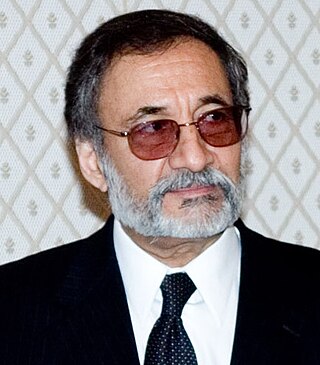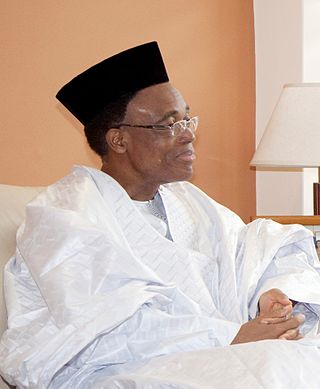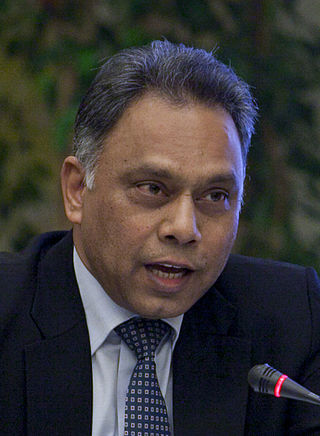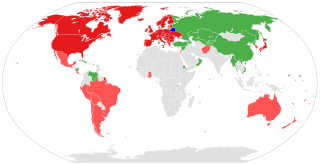
The United Nations Human Rights Council (UNHRC) is a United Nations body whose mission is to promote and protect human rights around the world. The Council has 47 members elected for staggered three-year terms on a regional group basis. The headquarters of the Council are at the United Nations Office at Geneva in Switzerland.
Bertrand G. Ramcharan of Guyana, a former United Nations official who once held functional diplomatic status, was from 2011 to 2015 President of UPR Info, an NGO working to promote and strengthen the Universal Periodic Review. He is also former chancellor of the University of Guyana, Senior Fellow at the Ralph Bunche Institute for International Studies and currently visiting professor of international law in Lund University, Sweden. Ramcharan is the first holder of the HEI Swiss Chair of Human Rights at the Geneva Graduate Institute of International Studies. He has a doctorate from the London School of Economics and is a barrister of Lincoln's Inn.

France has been a member of the United Nations (UN) since its foundation in 1945 and is one of the five countries, alongside China, Russia, the United Kingdom, and the United States, that holds a permanent seat on the United Nations Security Council (UNSC), which is responsible for maintaining international peace and security.

Prince Zeid bin Ra'ad bin Zeid al-Hussein is a Jordanian former diplomat who is the Perry World House Professor of the Practice of Law and Human Rights at the University of Pennsylvania. He is also the president and CEO of the International Peace Institute. He also served as United Nations High Commissioner for Human Rights from 2014 to 2018. He played a central role in the establishment of the International Criminal Court, and was elected the first president of the Assembly of State Parties of the International Criminal Court in September 2002. He also served as a political affairs officer in UNPROFOR in the former Yugoslavia from 1994 to 1996.

The International Centre for Democratic Transition (ICDT) is a non-profit organization founded in 2005 based in Budapest, Hungary which collects the experiences of recent democratic transitions and shares them with those who are determined to follow that same path.
His Excellency Mahinda Buddhadasa Samarasinghe is a former MP and the current Ambassador of Sri Lanka to the United States and Mexico and High Commissioner to Trinidad and Tobago.

Ahmed Shaheed is a Maldivian diplomat, politician and professor. On 24 March 2016, he was appointed for the sixth year running as the United Nations Special Rapporteur on the human rights situation in the Islamic Republic of Iran. Shaheed is also the Chairperson of the Geneva-based international human rights think-tank, Universal Rights Group, which was launched in January 2014. He now lives in England as a Professor of Human Rights Practice at the University of Essex. Shaheed is also a Senior Fellow at Raoul Wallenberg Human Rights Centre and a Fellow at the Bonavero Institute of Human rights at the University of Oxford.

Miroslav Lajčák is a Slovak politician and diplomat, former Minister of Foreign Affairs of the Slovak Republic. In addition, Lajčák also served as President of the United Nations General Assembly for the 72nd session from 2017 until 2018.

Zalmai Aziz is an Afghan diplomat and is the current ambassador of Afghanistan to the United Nations Office in Geneva and to Switzerland. He is the former Ambassador Extraordinary and Plenipotentiary of the Islamic Republic of Afghanistan to the Russian Federation and the former Deputy Minister of Foreign Affairs of Afghanistan.

Martin Ihoeghian Uhomoibhi is a Nigerian diplomat. He is best known as the former President of the United Nations Human Rights Council. Uhomoibhi's term as President was from 19 June 2008 to 18 June 2009. Martin Uhomoibhi served as Permanent Secretary of the Nigerian Ministry of Foreign Affairs. In October 2015 he was appointed as Joint Special Representative for Darfur and Head of the African Union-United Nations Hybrid Operation in Darfur (UNAMID).

Felice Diane Gaer was an American human rights defender and advocate. She worked on human rights matters and was a longstanding member and the former chair of the United States Commission on International Religious Freedom. She was a member of the US National Commission to UNESCO.

Dilip Sinha is an Indian diplomat and former public administrator. He served in the Indian Foreign Service from 1978 to 2014 and as chairman of the Manipur Public Service Commission, India, from 2015 to 2016. Ambassador Sinha is a public speaker on international security, Afghanistan-Pakistan-Iran and environmental diplomacy. He is the author of Legitimacy of Power: The Permanence of Five in the Security Council. The book traces the origins of international security cooperation and scrutinizes the moorings of the UN Security Council's powers in international law.

The National Commission on Human Rights is the national human rights institution (NHRI) of Indonesia. As with other NHRIs, its principal functions are the protection and promotion of human rights.

Prasad Kariyawasam is a Sri Lankan diplomat and the former Secretary to the Ministry of Foreign Affairs, the top diplomat in Sri Lanka. He was the International Affairs Adviser to Hon.Karu Jayasooriya, Speaker of the Parliament of Sri Lanka.He was the former Sri Lankan Ambassador to the United States. with concurrent accreditation as High Commissioner for Sri Lanka to Trinidad & Tobago and Ambassador (designate) to Mexico. He was also the Permanent Observer of Sri Lanka to the Washington-based Organization of American States (OAS).He has also served as Sri Lankan Ambassador to India, Afghanistan and Bhutan.
The Republic of Uruguay is located in South America, between Argentina, Brazil and the South Atlantic Ocean, with a population of 3,332,972. Uruguay gained independence and sovereignty from Spain in 1828 and has full control over its internal and external affairs. From 1973 to 1985 Uruguay was governed by a civil-military dictatorship which committed numerous human rights abuses.

Hernán Santa Cruz was a Chilean lawyer and diplomat, Chile's first delegate to the United Nations and one of the nine original drafters of the Universal Declaration of Human Rights.

Juan Fernando Lugris is an Uruguayan diplomat specialized in multilateral negotiations related to the environment, human rights, trade and regional integration, currently serving as the Ambassador of Uruguay to China and Mongolia. Lugris became the first Permanent Representative of Uruguay to UNEP and UN-Habitat and was the Chair of the Intergovernmental Negotiating Committee (INC) in charge of developing a legally binding global instrument on mercury known as the Minamata Convention on Mercury.

The following is a list of the official reactions to the 2020 Belarusian presidential election and the surrounding 2020 Belarusian protests.
Mohamed al-Bambary (1969/70) is a Sahrawi media activist. He was arrested and charged with "belonging to a criminal gang, taking part in a murder, contributing to a public disturbance, battery resulting in death, vandalism of public property, and assaulting officials in the performance of their duties,”. Initially sentenced to twelve years imprisonment, his term was reduced to six years following a re-trial.

Smiljana Knez is a Slovenian diplomat and Ambassador-at-Large for Climate Diplomacy. From August 2019 to December 2022 she served as a Foreign Policy Advisor of the President of the Republic of Slovenia. She was posted as Slovenia’s Ambassador to Croatia and to the Czech Republic. Before that, she was a Human Rights Director in the Ministry of Foreign Affairs in Slovenia. In 2008, during Slovenia’s Presidency to the Council of the European Union, she chaired the EU Working Group on Human Rights (COHOM). In 2010 she led the Slovenian delegation at the presentation of the Periodic report of Slovenia on the implementation of the Convention on Elimination of Racial Discrimination.
















